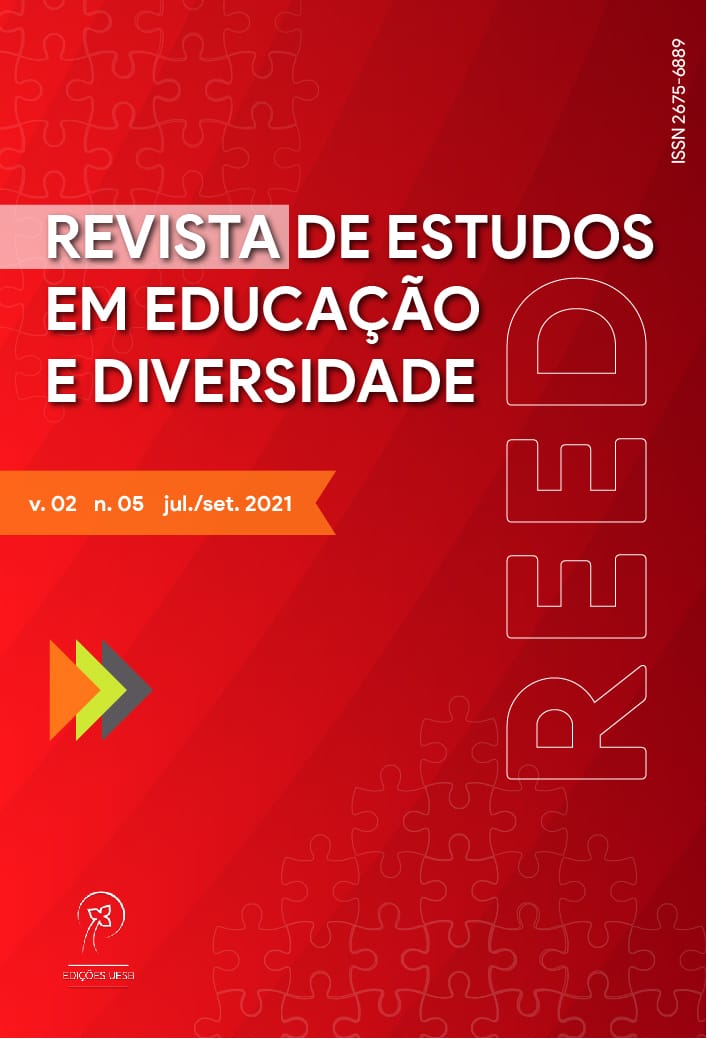POINT TO POINT, FROM THE ABCs TO COMPREHENDING THE WORLD: FREIREAN EXPERIENCES BEYOND THE SCHOOL SPACE
DOI:
https://doi.org/10.22481/reed.v2i5.9261Keywords:
Pedagogy of autonomy, Non-Formal Education, Non-School EducationAbstract
The presence of Paulo Freire in brazilian education transcends the school space, in a way that makes it present in many diverse contexts. In the specific case of non-school spaces, be them social projects, associations, non-governmental organizations or militant territories, the educator, armed with a pedagogy of autonomy, will never make themselves impartial, although always in a rigorously ethical position. Having the ethnographic perspective as a base, the notion of Non-Formal Education and the thinking of Paulo Freire, this research sought to reflect, based on a case study, the possibilities of the pedagogue’s role for beyond the school space, at Ponto de Leitura, a social project in Amargosa - Bahia - Brazil. Participating observations, semi-structured interviews and notes in a field journal were carried out. From the lived experience of this project, it was possible to notice how much the presence of a pedagogue in spaces of non-formal education is important. It was observed that the founder of the organization developed a methodology of her own by giving an identity to the popular and liberatory project very much different from a traditional profile. All of her pedagogic work is intertwined with the interpersonal relationships with the children inside and outside of the project, as well as the incentive to read and comprehend the world.
Downloads
References
ANDRÉ, M. E. D. A. Estudo de caso em pesquisa e avaliação educacional. Brasília: Líber Livro, 2005.
ARROYO, M. Paulo Freire e o Projeto Popular para o Brasil. In: SOUZA, A. I. (Orgs.). Paulo Freire: vida e obra. São Paulo: Expressão Popular, 2010.
BRANDÃO, C. R. O que é educação. São Paulo: Brasiliense, 2007.
FALCO, A. M. C; MOREIRA, J. A. S. A gestão do trabalho pedagógico em espaços escolares e não escolares: um debate acerca da formação do pedagogo no Brasil. Boletim Técnico do Senac, Rio de Janeiro, v. 43, n. 1, p. 256-273, 2017. Disponível em: http://www.bts.senac.br/index.php/bts/article/view/417/377. Acesso em: 03 ago. 2018.
FAVRET-SAADA, J. Ser afetado. Cadernos de Campo, n. 13, p. 155-161, 2005. Disponível em: https://www.revistas.usp.br/cadernosdecampo/article/view/50263/54376. Acesso em: 03 ago. 2018.
FERREIRA, C. A. L. Pesquisa Qualitativa e Quantitativa: perspectivas para o campo da educação. Revista Mosaico, v. 8, n. 2, p. 173-182, 2015. Disponível em: http://revistas.pucgoias.edu.br/index.php/mosaico/article/view/4424/2546. Acesso em: 03 ago. 2018.
FLICK, U. Desenho da pesquisa qualitativa. Porto Alegre: Bookman, 2009.
FREIRE, P. A pedagogia do Oprimido. Rio de Janeiro: Paz e Terra, 1987.
______. A importância do ato de ler: em três artigos que se completam. São Paulo: Cortez, 1989.
______. Pedagogia da Autonomia: saberes necessários à prática educativa. Rio de Janeiro: Paz e Terra, 1996/2002.
FREIRE, P.; NOGUEIRA, A. Teoria e Prática em Educação Popular. Petrópolis, RJ: Vozes, 1989.
FREIRE, P.; MACEDO, D. Alfabetização: leitura do mundo, leitura da palavra. Rio de Janeiro: Paz e Terra, 2011.
FREITAS, H. C. L. CNE ignora entidades da área e aprova Parecer e Resolução sobre BNC da Formação. Revista Educar Mais, v. 4, n.1, p. 1-3, 2020. Disponível em: https://periodicos.ifsul.edu.br/index.php/educarmais/article/view/1711. Acesso: 03 mar. 2021.
GODOY, A. S. Pesquisa Qualitativa: Tipos Fundamentais. Revista de Administração de empresas, v. 35, n. 3, p. 20-29, 1995.
GOHN, M.G. Educação não formal, participação da sociedade civil e estruturas colegiadas na escola. Ensaio: avaliação e políticas públicas em educação, Rio de Janeiro, v.14, n. 50, p.27-38, 2006. Disponível em: https://www.scielo.br/j/ensaio/a/s5xg9Zy7sWHxV5H54GYydfQ/?lang=pt. Acesso em: 03 ago. 2018.
______. Educação não formal e o educador social: a atuação do desenvolvimento de projetos sociais. São Paulo: Cortez, 2013.
LAPLANTINE, F. A descrição etnográfica. São Paulo: Terceira Margem, 2004.
LIBÂNEO, J.C. Pedagogia e pedagogos, para quê? São Paulo: Cortez, 2010.
MATTOS, C. L. G. A abordagem etnográfica na investigação científica. In MATTOS, C. L. G.; CASTRO, P. A. Etnografia e educação: conceitos e usos. Campina Grande: EDUEPB, 2011, p. 49-83.
TEIXEIRA NETO, J. Mochilas existenciais e insurgências curriculares: etnocurrículos instituindo interações em cenários das pedagogias culturais do tempo presente. 2014. Tese (Doutorado) – Universidade Federal da Bahia, Salvador.
VYGOTSKY, L. Pensamento e Linguagem. São Paulo: Martins Fontes, 1991.
Downloads
Published
How to Cite
Issue
Section
License
Copyright (c) 2021 Revista de Estudos em Educação e Diversidade - REED

This work is licensed under a Creative Commons Attribution 4.0 International License.
You are free to:
Share - copy and redistribute the material in any medium or format; Adapt - remix, transform, and build from the material for any purpose, even commercially. This license is acceptable for Free Cultural Works. The licensor cannot revoke these freedoms as long as you follow the terms of the license.
Under the following terms:
Attribution - You must appropriately give credit, provide a link to the license, and indicate if any changes have been made. You may do so in any reasonable way, but not in a way that suggests that you or your use is endorsed by the licensor.
There are no additional restrictions - You cannot apply legal terms or technological measures that legally restrict others to make any use permitted by the license.






